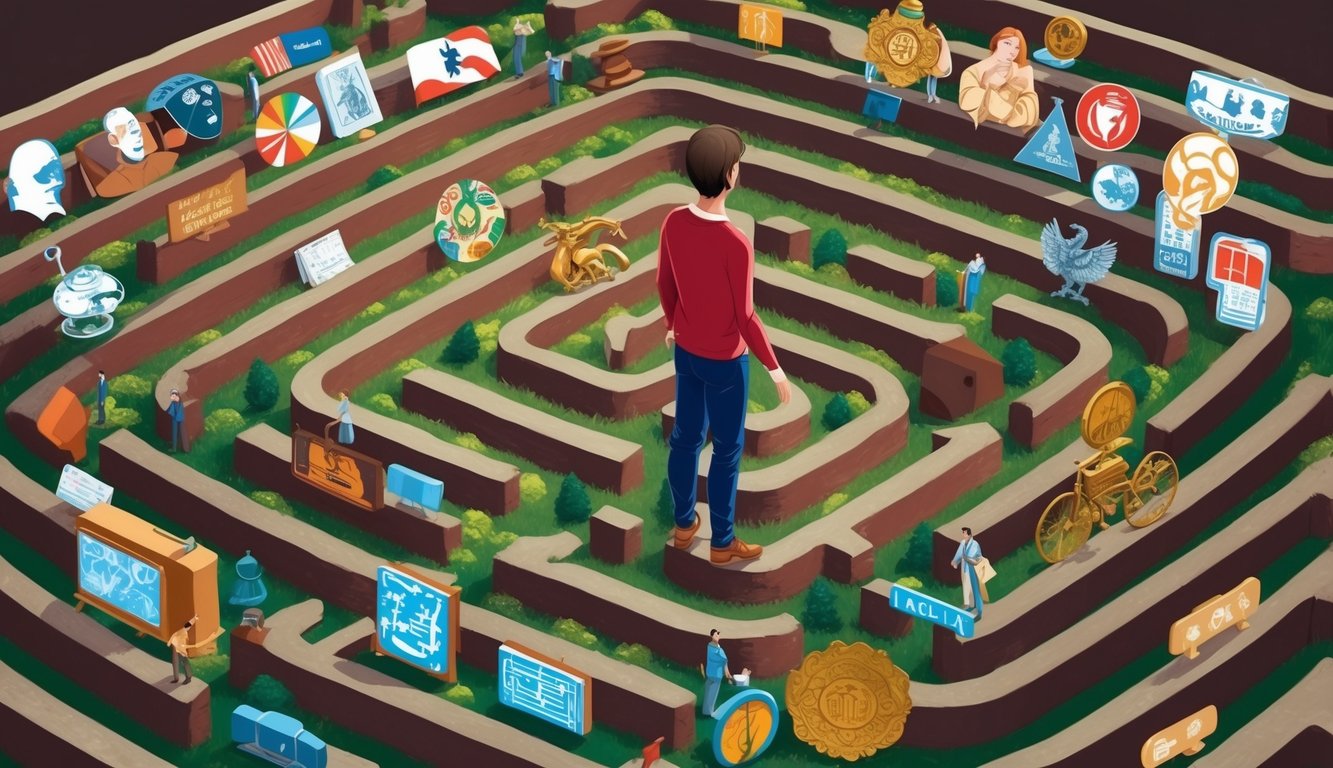Align Your Life with Your True North
The Power Quadrant System decodes your natural talents and pinpoints the career, timing and relationships that let you earn more, love deeper, and wake up eager for the day.
- Uncover your #1 high-income strength
- Draw in partners who raise your energy
- Work when your body’s clock is in “flow”
Dreams about being lost often leave us feeling unsettled and confused upon waking.
These common nocturnal experiences can reflect our deepest anxieties and uncertainties in waking life.
Dreams of being lost typically symbolize feelings of insecurity, a lack of direction, or fear of the unknown in your personal or professional life.
You might find yourself wandering through unfamiliar streets, unable to find your way home, or searching for something important that remains just out of reach.
These scenarios can mirror real-life situations where you feel overwhelmed, unprepared, or unsure of your next steps.
Your subconscious mind may be processing changes, transitions, or challenges you’re currently facing.
While unsettling, these dreams can serve as valuable insights into your emotional state and life circumstances.
They may be prompting you to examine areas where you feel uncertain or encouraging you to seek guidance and support.
By exploring the context and emotions surrounding your lost dreams, you can gain a deeper understanding of your waking concerns and work towards finding your path.
Key Takeaways
- Dreams of being lost often reflect feelings of uncertainty or lack of direction in your waking life
- These dreams can provide valuable insights into your emotional state and current life challenges
- Exploring the context of your lost dreams can help you address underlying concerns and find clarity
Understanding Dreams About Being Lost
Dreams about being lost can reveal important insights about your subconscious mind and current life circumstances.
They often reflect feelings of uncertainty, confusion, or a lack of direction in your waking life.
Decode Your Personal Success Blueprint
Power Quadrant System shows you the exact career, relationships, and daily rhythm that match your natural DNA—so you earn more, work happier, and connect deeper.
- Pinpoint your #1 money-making talent
- Erase conflict & attract ideal partners
- Multiply productivity with perfect timing
Psychological Perspectives
Your dreams of being lost may stem from anxieties or insecurities you’re experiencing.
They could indicate you feel overwhelmed by changes or decisions you’re facing.
These dreams might also point to a sense of losing your identity or purpose.
Psychologists suggest exploring the emotions you felt during the dream.
Were you scared, frustrated, or oddly calm? Your reactions can provide clues about how you’re handling challenges in reality.
Sometimes, being lost in a dream represents a desire for change or adventure.
It may signal you’re ready to explore new aspects of yourself or your life.
Common Themes and Symbols
The setting of your “lost” dream carries significance.
Being lost in a city might reflect feeling overwhelmed by social pressures or work stress.
Tap Into Your Built-In Success GPS
The Power Quadrant System deciphers your genetic blueprint so you can lock onto the career, income and relationships that feel effortless—and wildly rewarding.
- Zero in on your natural high-earning genius
- Sync with partners who boost your vibe
- Wake up driven, finish days fulfilled
A forest setting could symbolize confusion about your personal growth or life path.
Recurring symbols to note include:
- Maze-like environments: Feeling trapped by complex problems
- Empty or unfamiliar places: Sense of isolation or disconnection
- Darkness: Fear of the unknown or lack of clarity
- Crowds: Feeling insignificant or overlooked
Your attempts to find your way in the dream are important too.
Do you ask for help? Try to retrace your steps? Your dream actions can reveal your typical problem-solving approaches in real life.
Remember, dream interpretation is personal.
While general meanings exist, your unique experiences and emotions shape your dreams’ significance.
The Emotional Landscape of Dreams
Dreams about being lost often evoke intense emotions.
These dream experiences tap into deep-seated feelings of uncertainty, vulnerability, and disorientation that can mirror real-life anxieties.
Navigating Anxiety and Stress
When you dream of being lost, anxiety often takes center stage.
You might feel your heart racing as you search for familiar landmarks in vain.
This mirrors the stress you face in waking life when confronting unknown situations or difficult decisions.
Anxiety in these dreams can manifest as a sense of urgency or impending doom.
You might feel pressured to find your way before something bad happens.
This reflects your real-world worries about meeting deadlines or living up to expectations.
Dreams of being lost can also trigger feelings of helplessness.
You may find yourself unable to ask for directions or use your phone, amplifying your stress and frustration.
Exploring Fear and Vulnerability
Fear is a common companion in dreams of being lost.
You might encounter scary scenarios or threatening figures as you wander unfamiliar terrain.
These elements represent your vulnerabilities and insecurities.
Being lost in a dream can make you feel exposed and defenseless.
You might be without resources, separated from loved ones, or in a hostile environment.
This mirrors feelings of isolation or inadequacy you may experience in your daily life.
Your dream might intensify these fears by placing you in extreme situations.
You could be lost in a vast desert, dense jungle, or abandoned city.
Each setting taps into different aspects of your fears and vulnerabilities.
The Role of Overwhelm and Confusion
Feeling overwhelmed is a key feature of dreams about being lost.
You might face a barrage of confusing signs, misleading directions, or constantly shifting landscapes.
This reflects times when life feels chaotic and unpredictable.
Confusion in these dreams can manifest as an inability to think clearly or make decisions.
You might find yourself going in circles or forgetting why you started your journey.
This mirrors real-life situations where you feel directionless or unsure of your goals.
Dreams of being lost can also highlight feelings of being out of place.
You might be in a foreign country where you don’t speak the language or in a social situation where you don’t fit in.
This represents struggles with identity and belonging in your waking life.
Symbols of Disorientation
Dreams of being lost often manifest through vivid symbols that represent feelings of confusion and uncertainty.
These symbols can take various forms, each carrying its own significance in relation to your waking life experiences.
Being Lost in a Forest
You find yourself wandering through a dense forest, unable to find your way out.
The towering trees block your view of the sky, leaving you disoriented.
This symbol reflects feelings of being overwhelmed by life’s complexities.
The forest represents the unknown aspects of your life or personality.
As you struggle to navigate through the thick undergrowth, it mirrors your attempts to make sense of confusing situations.
The darkness between the trees can symbolize your fears and anxieties.
The lack of a clear path forward may indicate uncertainty about your life’s direction or important decisions you’re facing.
Endless Searching in a Crowd
You’re frantically searching for someone or something in a sea of unfamiliar faces.
The crowd moves around you, making it impossible to find what you’re looking for.
This symbol represents feelings of isolation and disconnection.
The faceless individuals in the crowd might symbolize your struggle to connect with others or find your place in society.
Your fruitless search could indicate a sense of purposelessness or a fear of missing out on important opportunities.
As you push through the throng, you might feel increasingly anxious and alone.
This reflects the stress of trying to fit in or stand out in your waking life.
The Abyss of the Sea
You’re adrift in a vast, endless ocean with no land in sight.
The depths below are dark and mysterious, filling you with a sense of dread.
This symbol represents feelings of being overwhelmed by emotions or life circumstances.
The endless expanse of water symbolizes the unknown aspects of your subconscious mind.
As you float without direction, it mirrors feelings of helplessness or lack of control in your waking life.
The dark depths below can represent your fears and anxieties lurking beneath the surface.
Your struggle to stay afloat might reflect your efforts to keep your head above water in challenging situations.
Interpreting Personal Growth and Challenges
Dreams of being lost often reflect inner struggles and opportunities for personal development.
These dreams can provide insights into your current life circumstances and emotional state.
Journeys of Self-Reflection
When you dream of being lost, it might signal a need for introspection.
These dreams can highlight areas of your life where you feel uncertain or directionless.
Consider what aspects of your waking life feel confusing or overwhelming.
Are you questioning your career path? Unsure about a relationship?
Use these dreams as a prompt to explore your values and goals.
They may be urging you to reconnect with your authentic self.
Try journaling about your dreams and the emotions they evoke.
This can help you uncover hidden feelings and desires.
Remember, feeling lost can be the first step towards finding yourself.
Embrace the journey of self-discovery these dreams offer.
Dealing with Life Transitions
Dreams of being lost often coincide with major life changes.
Starting a new job, moving to a new city, or ending a relationship can trigger these dreams.
These transitions can leave you feeling disoriented in your waking life, which may manifest in your dreams.
View these dreams as your mind’s way of processing change.
They reflect your efforts to navigate unfamiliar territory.
To cope with transitions:
- Establish new routines to create a sense of stability
- Seek support from friends and family
- Set small, achievable goals to build confidence
Embrace the growth opportunities that come with change.
Your dreams of being lost may be encouraging you to step out of your comfort zone.
Common Life Situations Reflected in Dreams
Dreams of being lost often mirror real-life experiences and challenges.
You might find your subconscious processing feelings of uncertainty or major life changes through these nocturnal narratives.
Stress of the Unknown in a New City
Moving to a new city can be exhilarating and daunting.
Your dreams might reflect this by placing you in unfamiliar streets or buildings.
You may find yourself wandering aimlessly, unable to find your way home or to work.
This dream scenario often represents your anxiety about navigating a new environment.
It can symbolize your struggle to establish routines or make new connections.
Don’t be surprised if landmarks keep shifting or street names change in these dreams.
Your brain is processing the overwhelming amount of new information you’re taking in daily.
Relationship Dynamics and Being Left Behind
Dreams of being lost can also reflect your fears about relationships.
You might dream of losing sight of your partner in a crowd or being unable to find them in a familiar place.
These dreams often surface when you’re feeling insecure in your relationship or fear abandonment.
They can also occur when you’re experiencing significant changes in your personal life.
You might feel like you’re falling behind while others move forward.
This sensation can manifest as dreams where you’re struggling to keep up with a group or find your way back to loved ones.
Career Pressure and Important Decisions
Work-related stress frequently seeps into dreams about being lost.
You might find yourself in an unfamiliar office building, unable to locate an important meeting room.
These dreams often reflect the pressure of making crucial career decisions.
You may feel uncertain about your professional path or worry about the consequences of your choices.
Dreams of being lost at work can also symbolize imposter syndrome.
You might feel like you’re navigating your career without a map, unsure if you’re heading in the right direction.
Feeling Lost versus Actual Loss
Dreams about being lost can stem from emotional disorientation or tangible losses in your life.
These experiences, while often intertwined, have distinct psychological impacts and manifestations in your subconscious.
Distinguishing Emotional Disorientation
You might feel lost without a clear sense of direction in life.
This can manifest in dreams as wandering unfamiliar streets or being unable to find your way home.
It’s your mind’s way of processing uncertainty or a lack of purpose.
Dreams of being lost can also reflect feelings of inadequacy or imposter syndrome.
You might see yourself in a maze-like office building, unable to find your desk.
This could signify doubts about your career path or abilities.
Sometimes, these dreams occur during major life transitions.
Moving to a new city, starting a new job, or entering a new relationship can trigger feelings of disorientation that seep into your dreamscape.
Grieving a Loved One or an Aspect of Life
Actual loss can profoundly impact your dreams.
Losing a loved one might lead to dreams where you’re searching for them in crowded places.
This reflects your waking struggle to cope with their absence.
Dreams about being lost can also represent the loss of a job, relationship, or opportunity.
You might find yourself in an empty school or workplace, symbolizing the void left by this loss.
Grief can manifest as dreams where familiar places suddenly become unrecognizable.
Your childhood home might appear distorted or inaccessible, mirroring your feelings of disconnect from your past self or former life.
These dreams often occur as you process and adapt to significant changes.
They’re a normal part of the grieving process, helping you come to terms with your new reality.
Coping Mechanisms and Seeking Help
Dreams of being lost can be unsettling, but there are ways to find clarity and peace.
Professional guidance and self-reflection can help you navigate these confusing experiences and uncover their deeper meanings.
The Value of a Therapist’s Insight
A therapist can offer valuable perspectives on your lost dreams.
They’re trained to help you explore the emotions and thoughts behind these experiences.
In therapy sessions, you might uncover hidden anxieties or unresolved issues triggering these dreams.
Your therapist can suggest coping strategies tailored to your needs.
These might include:
- Journaling about your dreams
- Practicing relaxation techniques before bed
- Exploring dream interpretation methods
Remember, there’s no shame in seeking help.
A therapist provides a safe space to discuss your concerns and work towards understanding your subconscious mind better.
Building Self-Esteem and Security
Boosting your self-esteem can help reduce feelings of being lost in dreams and in life.
Start by acknowledging your strengths and achievements, no matter how small they seem.
Try setting achievable goals and celebrating when you reach them.
This builds confidence and a sense of direction.
Surround yourself with supportive people who appreciate you for who you are.
Consider creating a “security toolkit” – things that make you feel grounded and safe.
This might include:
- A comforting object
- A favorite song
- A calming breathing exercise
By working on your self-esteem and sense of security, you’re building resilience against feelings of being lost or overwhelmed.
Linking Dream Themes with Real World Skills
Dreams about being lost can offer valuable insights into developing important real-world abilities.
By examining these dreams, you can uncover ways to enhance your skills and intuition in waking life.
Learning from Lostness
Being lost in dreams often reflects feelings of uncertainty or lack of direction.
You can use these experiences to build resilience and problem-solving skills.
Pay attention to how you navigate unfamiliar dream landscapes.
Do you ask for help? This could indicate a need to improve your communication in real life.
Do you rely on landmarks? This might suggest strengthening your observation skills.
By analyzing your dream reactions, you can identify areas for growth in your waking life.
Practice applying these insights to challenging situations you face daily.
Enhancing Intuition and Decision Making
Dreams of being lost can sharpen your intuition and decision-making abilities.
Notice the choices you make when lost in a dream.
Do you trust your gut or second-guess yourself?
Try applying dream-based intuition to real-world scenarios:
- When facing an important task, pause and recall how you’ve navigated dream challenges
- Practice quick decision-making in low-stakes situations to build confidence
By connecting dream experiences to waking life, you can develop a stronger sense of direction and trust in your abilities.
This can lead to more confident choices in your personal and professional life.
When to Take Action
Dreams about being lost often signal a need for change or direction in your life.
Recognizing these signs can prompt personal growth and help you navigate uncertain times.
Acknowledging the Need for Change
Pay attention to recurring dreams of being lost.
If they persist, it’s time to examine your current situation.
Are you feeling stuck in your job or relationship? Do you lack a sense of purpose? These dreams might be your subconscious nudging you to make changes.
Consider keeping a dream journal to track patterns.
Look for common themes or emotions in your lost dreams.
Do you feel anxious, frustrated, or relieved? These feelings can provide clues about areas in your life that need attention.
Trust your gut instincts.
If you wake up feeling unsettled after a lost dream, take it as a sign to reflect on your life’s direction.
Setting Directions for Personal Development
Start by identifying your core values and goals.
What matters most to you? Where do you want to be in the next few years? Use these insights to create a roadmap for your personal growth.
Break down your goals into smaller, manageable steps.
This approach makes big changes less overwhelming and more achievable.
Set realistic timelines for each step to keep yourself accountable.
Seek support from friends, family, or a mentor.
They can offer fresh perspectives and encouragement as you navigate new paths.
Consider professional guidance if you’re struggling to find direction on your own.
Take small risks to step out of your comfort zone.
Try new hobbies, meet new people, or learn a new skill.
These experiences can help you discover hidden talents and passions.
Cultural and Social Influences on Dream Interpretation
Your social environment and cultural background shape how you interpret dreams about being lost.
These influences affect both your personal experiences and the collective subconscious of your community.
Impact of Social Relationships
Your connections with others play a key role in how you perceive dreams of being lost.
Close relationships can provide comfort and support when you feel adrift in your waking life, influencing your dream content.
In some cultures, dreaming of being lost may signify:
- A need for guidance from elders or mentors
- Disconnection from family or community
- Uncertainty about your place in society
Your social circle’s beliefs about dreams can also affect your interpretation.
If those around you view dreams as meaningful, you’re more likely to seek deeper meaning in your lost dreams.
Understanding the Collective Subconscious
Your cultural background contributes to a shared pool of symbols and meanings that influence your dream interpretations.
This collective subconscious varies widely across societies.
In Western cultures, being lost in dreams often represents:
- Feeling directionless in life
- Anxiety about the future
- Loss of identity or purpose
Other cultures may see it differently:
- As a spiritual journey
- A call to reconnect with ancestral roots
- An opportunity for growth and self-discovery
Your cultural context provides a framework for understanding these dreams, shaping how you process and respond to feelings of being lost in both sleep and waking life.
Frequently Asked Questions
Dreams about being lost often reflect inner emotions and life circumstances.
They can provide insight into spiritual journeys, personal challenges, and subconscious fears.
What’s the spiritual significance of feeling lost in my dreams?
Feeling lost in dreams may symbolize a spiritual quest or search for meaning.
It could indicate you’re exploring new aspects of yourself or seeking guidance.
These dreams might encourage you to trust your intuition and embrace personal growth.
Can getting lost in a dream signal something about my waking life direction?
Yes, it can.
Dreams of being lost often reflect feelings of uncertainty or lack of direction in your waking life.
You might be facing a crossroads or struggling to make an important decision.
Consider areas where you feel stuck or unsure to gain clarity.
Why do I keep having dreams where I can’t find my way back home?
Recurring dreams of not finding your way home may suggest feelings of displacement or longing for comfort.
You might be experiencing homesickness or a desire for familiarity.
These dreams could also represent a search for your true self or purpose.
Similarly, dreams about hidden rooms may symbolize undiscovered aspects of yourself or new opportunities waiting to be explored.
They can reflect a sense of curiosity or a realization that there is more to your life than what is currently visible.
Both types of dreams suggest a deeper inner journey toward self-awareness and fulfillment.
In my dream, I’m wandering in an unfamiliar city; what could that imply?
Wandering in an unknown city in your dream might reflect feelings of being overwhelmed by new experiences.
It could signify a phase of exploration in your life.
You may be adapting to changes or seeking new opportunities.
What’s the biblical interpretation of losing one’s way in a dream?
In biblical terms, losing your way in a dream might symbolize spiritual wandering or straying from your faith.
It could represent a need for divine guidance or a call to return to your spiritual path.
Consider reflecting on your beliefs and values.
I dreamed I lost an important item, what might that mean?
Dreaming of losing a valuable item often represents fear of losing something important in your waking life.
It could be a relationship, opportunity, or aspect of yourself.
This dream might prompt you to appreciate what you have and address any neglected areas in your life.










